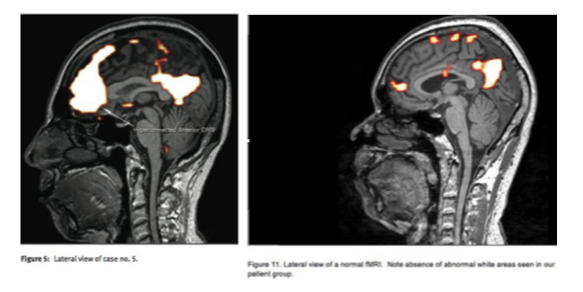Difference In Brain Activity With EHS Compared To Non EHS
|
In July 2017, Dr. Gunnar Heuser, MD, PhD, Former Member of Brain Research Institute, UCLA Medical Center who has treated over 100 EHS patients, arranged for fMRI studies on EHS patients to document potential abnormalities. (Functional magnetic resonance imaging or functional MRI (fMRI) measures brain activity by detecting changes associated with blood flow. https://en.wikipedia.org/wiki/Functional_magnetic_resonance_imaging)
In 10 adults with EHS, all 10 fMRIs showed abnormalities that were similar, often described as a hyper connectivity of the anterior component of the default mode in the medial orbitofrontal area. Regular MRI studies done on these patients were unremarkable (i.e. normal). Another finding of this study was that many of the EHS patients had a history of head injury sometime prior to EHS development.
The 10 patients had mainly neurological EHS symptoms such as headaches, memory and cognitive impairment, attention deficit disorder, and changes in behavior
This study, in addition to the 2014 DeLuca study https://www.hindawi.com/journals/mi/2014/924184/ , which found statistically significant genetic and metabolic differences between EHS and non-EHS, is further evidence of EHS as a medical condition, and not a psychosomatic one.
“We propose that functional MRI studies should become a diagnostic aid when evaluating a patient who claims electrohypersensitivity (EHS) and has otherwise normal studies. Interestingly, the differential diagnosis for the abnormalities seen on the fMRI includes head injury. It turns out that many of our patients indeed had a history of head injury which was then followed sometime later by the development of EHS. Many of our patients also had a history of exposure to potentially neurotoxic chemicals, especially mold. Head injury and neurotoxic chemical exposure may make a patient more vulnerable to develop EHS.”
Here's the press release, just released today, Dec. 5, 2017. The People's Initiative Foundation organized this study, and they are doing a teleconference press release in the USA on Dec. 7 at 12 noon PST. If anyone has any international media contacts they would like to pass the press release on to, the People's Initiative Foundation would be extremely grateful https://www.prnewswire.com/news-releases/pilot-study-shows-dramatic-difference-in-brain-activity-with-ehs-electrohypersensitive-cases-as-compared-to-controls-non-ehs-300566854.html?tc=eml_cleartime
EHS fMRI brain scan Non-EHS fMRI brain scan (huge white spots) Original study published in July 2017, without the controls, full text (fMRI's of all 10 EHS patients can be seen here, and the similarities are all very obvious):
Corrigendum to the study, which includes fMRI scans of the controls (non- EHS)
|
||||||||||
| Free forum by Nabble | Edit this page |





